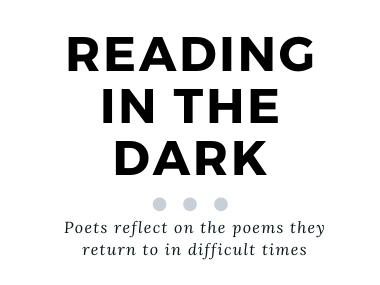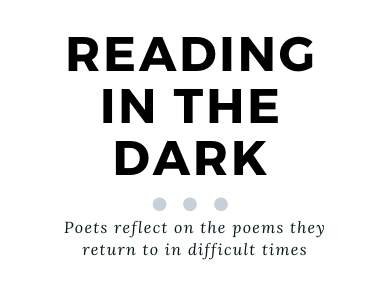Reading in the Dark
Dean Rader on Joy Harjo’s “Perhaps the World Ends Here”

Perhaps the World Ends Here
The world begins at a kitchen table. No matter what, we must eat to live.
The gifts of earth are brought and prepared, set on the table. So it has been since creation,
and it will go on.
We chase chickens or dogs away from it. Babies teethe at the corners. They scrape their
knees under it.
It is here that children are given instructions on what it means to be human. We make
men at it, we make women.
At this table we gossip, recall enemies and the ghosts of lovers.
Our dreams drink coffee with us as they put their arms around our children. They laugh
with us at our poor falling-down selves and as we put ourselves back together once
again at the table.
This table has been a house in the rain, an umbrella in the sun.
Wars have begun and ended at this table. It is a place to hide in the shadow of terror.
A place to celebrate the terrible victory.
We have given birth on this table, and have prepared our parents for burial here.
At this table we sing with joy, with sorrow. We pray of suffering and remorse. We give
thanks.
Perhaps the world will end at the kitchen table, while we are laughing and crying, eating
of the last sweet bite.
"Perhaps the World Ends Here" from The Woman Who Fell From the Sky by Joy Harjo. Copyright © 1994 by Joy Harjo. Used by permission of W.W. Norton & Company, Inc..
In response to the Coronavirus pandemic, we asked poets to write about the poems they return to in difficult times—to find solace, perspective, or even a moment of delight. Subscribe to the PSA newsletter for more Reading In The Dark responses and to keep updated with the PSA.
With so much talk—whether gallows humor or justified fear—about the current pandemic hastening the end of the world, it is not the R.E.M. song I keep thinking about but this lovely poem by the United States Poet Laureate Joy Harjo (Mvskoke/Creek). Though Joy and I come from different parts of Oklahoma (neither of which are Tiger King territory), her work feels like home, and this poem is comfort food (and I’m hungry for so much). Indeed, since the shelter-in-place orders, my wife, our two young sons, and I have been spending a lot of time at the table, talking about love, life, family, and death. For Harjo, the center is the table, and the table is the center—what Rilke calls the “center of all centers, the core of cores.” “It is here,” Harjo writes, “that children are given instructions on what it means to be human.” I’m not sure any sentence better captures the fraught realities of our distance learning lessons, FaceTime calls with family, or conversations about what we are enduring as a species.
With its long lines and concrete declarative syntax, Joy’s poem lands somewhere between a journal entry and a proverb. How amazing when a poem can be both confessional and wise. When she writes, “At this table we sing with joy, with sorrow. We pray of suffering and remorse. We give thanks,” the poem seems to be uttering a contradiction. And yet, we understand we are in the presence of a knowledge that passes all understanding. Do we celebrate both fullness and hunger? All the time. Do we give thanks for suffering? We do. Do we mourn, in some ways, our own happiness, our own life? Without question. Do we gather ourselves around the table that is our own being with the deep awareness we will one day no longer be? Daily.
I love this poem because it reminds us of those human endeavors that both go beyond us and define who we are, when we do not need pre-heated platitudes or sweet solace but rather the empty table round with relation—whether just before the feast or just after.
—Dean Rader
Dean Rader's recent collection Self-Portrait as Wikipedia Entry was a finalist for the Oklahoma Book Award and the Northern California Book Award. He is a professor at the University of San Francisco and a 2019 Guggenheim Fellow in Poetry.

